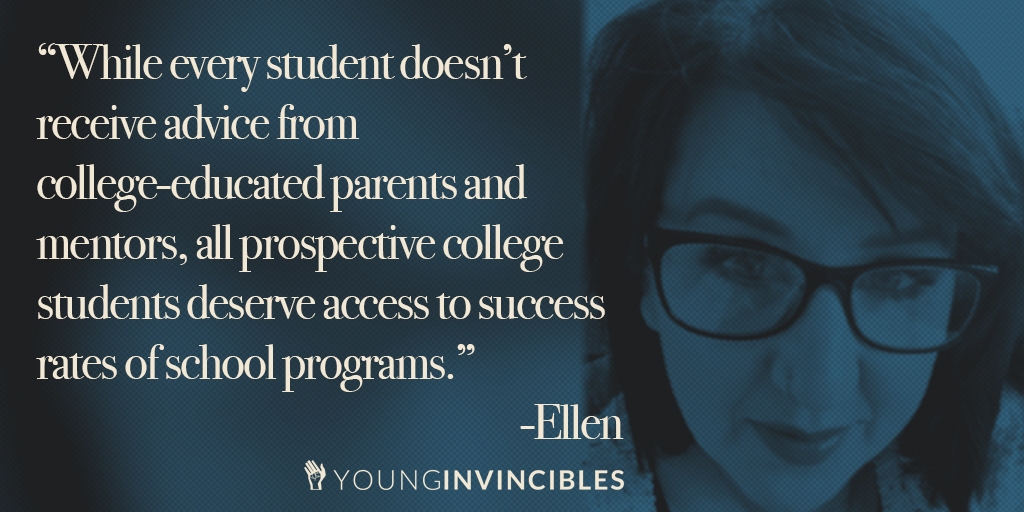To say my educational journey has been a rocky road is an understatement. That journey–which included four institutions and a subsequent trail of debt–could have been much easier if I had more information about my schools and their programs. I didn’t have the best guidance growing up–I lived on my own since I was 15 and didn’t graduate from high school. When I turned 18, I knew I didn’t want a career in customer service, so at the recommendation of a family member I started classes at (the now notoriously defunct) Lamson Jr. College towards a certificate in word processing. Had I known how many Lamson students in the word processing program found relevant work after graduation, I may have changed my very expensive decision to attend. While every student doesn’t receive advice from college-educated parents and mentors, all prospective college students deserve access to success rates of school programs.
There were several red flags that I only discovered once I was enrolled. Lamson, a for-profit school which was located in my local shopping mall, accepted me without a GED. Of course, I was promised I would earn my GED, but was never offered classes to help me achieve this goal. I was also assured that a word processing certificate would put me on the path to a well-paying administrative career, but the school never offered career preparedness services. Three quarters of the way through my program, I was involved in a car accident, which caused me to spend nearly a year recovering from my injuries. Although I had to drop out of school, I was determined to complete my education.
I took another risk 20 years later and attended a community college where, given the quality of my last school, none of my credits transferred. I brought my prior loans out of default, paid my first semester out of pocket, and finally earned my GED. I went to school part-time to make up for the damage from Lamson, and I worked full-time.
When I was ready to transfer to a university, I was offered two different scholarships. One was to a state university and one was to a small private university. With the limited knowledge I had on graduation rates and career success from each institution, I chose the private university’s scholarship for the school’s prestige. While it did not cover my full tuition, I felt more comfortable at a smaller campus with advisors and administrators who would help me through the transition. It had an impressive graduation rate overall, but I had no access to how my particular program performed or if graduates were able to obtain jobs in their field, but this information is not available for any college or university. Fortunately, that institution was not the same predatory school that Lamson was. Nevertheless, I was cautious about my chances of finding work after graduation. I was an English major–a significant step upwards from word processing–and received overwhelming support from my professors. I was told that I would find plenty of job opportunities, but never saw stats released on the program’s success.
Financially, I struggled. I borrowed additional money that wasn’t covered by scholarships and Pell Grants. Things went from bad to worse in my second semester, when I was diagnosed with thyroid cancer and and withdrew from all of my classes. When I finally returned to school, I was still sick, had to drop classes again, and lost my job. Despite my good grades previously, I was in danger of not graduating.
I finally transferred a third time to Park University, where I am currently enrolled. I’m paying less for many of the same services I received at previous schools. I’m happy here, and I don’t feel manipulated. In hindsight, I wish I could have gone here immediately after completing my GED. Instead, unfortunately, I have debt passing through four different schools. My loans are near the limit. I will have to take fewer classes, and if I am able to graduate it will take me longer.
The odds are against me, but I’ll overcome it. Not everybody has the same perseverance as I have, and this is the part where a lot of people just stop, and those are the people I want to be an advocate for. Taxpayers do not contribute to Pell grants for students like me to be mislead and buried in debt, all driven by a severe lack of information. It’s time for our government to help provide us access to information so that those of us who seek to gain skills and be educated do not fall prey to colleges that can operate and turn a profit with no accountability.
Ellen Griffin is a full time college student studying Social Psychology at Park University. She hopes to use her education to improve the way people communicate with one another in business. She has a 15-year-old daughter who she hopes will be inspired by her educational journey.

